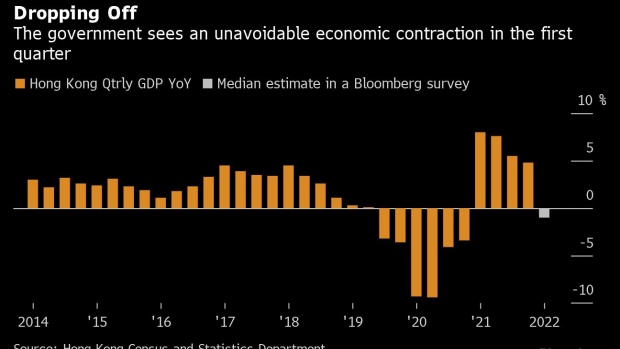Mar 21, 2022
Hong Kong Gives Economy Limited Boost With Easing of Virus Curbs
, Bloomberg News

(Bloomberg) -- Hong Kong’s move to ease some virus restrictions gave a boost to business sentiment, though many said the steps won’t go far enough in softening the economic blow from the city’s worst Covid outbreak since the pandemic began.
The government will reopen recreational venues, allow dining-in at restaurants to resume at night, and in bigger groups, and scrap flight bans to several countries, including the U.S. and U.K., it announced Monday. It will also halve the quarantine for international arrivals to one week.
The measures provide much-needed relief for restaurants and other businesses, but won’t prevent the economy from avoiding a contraction this quarter. Retail sales and business activity have already slumped to multi-month lows, while unemployment is set to worsen. For the tourism-reliant economy, a stronger recovery will depend on open borders, including with mainland China.
“Even if Hong Kong starts to lift some measures in April, the first half will be very poor,” said Natixis SA Asia Pacific chief economist Alicia Garcia Herrero. The economy might contract overall for that period, there is the potential for a rebound in cases, and the reopening with China looks like it will “take quite some time,” she said.
Garcia Herrero expects growth in a range of 1.5% to 2% this year even with recent stimulus measures. Economists in a Bloomberg survey had predicted 2.3% before Monday’s virus announcement was made.
Some business groups also expressed caution about the benefits the changes would bring. George Cautherley, vice chairman of the International Chamber of Commerce, said the quarantine restrictions remain a sticking point, making international business travel difficult.
Tom Bakker, general manager of the Dutch Chamber of Commerce in Hong Kong said businesses want to see a clear road map, since the government has previously rescinded easing measures.
What Bloomberg Economics Says...
“A big uncertainty is how Covid-19 case numbers fare after the city begins to reopen. If there is no significant rebound, the probability of our upside scenario -- with faster relaxation of restrictions -- would increase.”
Eric Zhu, China economist
For the full report, click here.
The restaurant industry has been one of the worst hit by surging virus cases and stringent social-distancing measures, including a ban on dining-in after 6 p.m. and restricting capacity at tables to two patrons. Over the month since the measures were implemented, some 3,500 restaurants have shut operations temporarily to cut costs, driving up the unemployment rate, said Simon Wong, president of the Hong Kong Federation of Restaurants and Related Trades.
Chief Executive Carrie Lam said Monday that most social-distancing rules will gradually be eased from April 21, and dining-in will be allowed at restaurants until 10 p.m., with a maximum of four people per table. The rules will be relaxed further over the following three months, she said.
While those measures will help ease the pain in the industry, businesses would have preferred a move sooner, Wong said.
“If we can implement the relaxation next week, for example, we can start recovering earlier, and it will reduce the pressure of rising unemployment rate for the government, as well as the pressure of having to rescue different industries, especially the restaurant industry,” he said.
Financial Secretary Paul Chan warned on Sunday that Hong Kong’s unemployment rate will worsen, and the economy will contract in the first quarter. The virus situation is key to determining the second-quarter outlook, he added in a blog post.
Johannes Hack, president of the German Chamber of Commerce, said the easing of the restrictions and reducing of the quarantine for international arrivals would bolster confidence in Hong Kong.
“We believe this is an important first step towards putting Hong Kong back on the map, not only as an international finance center, but also as a connector city for industry and commerce between mainland China and the rest of the world,” he said.
©2022 Bloomberg L.P.


